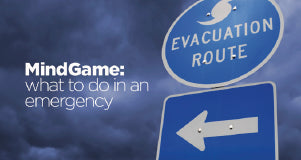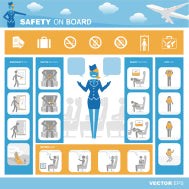
You’ve heard us say before that proper emergency preparation can mean the difference between life and death. It turns out that that’s truer than even we knew. Obviously having food and water stored and knowing some key survival skills are crucial to provide for our needs in an emergency situation. But researchers are noting an even more fundamental advantage to preparation.
In a recent article on
BBC.com, military survival instructor John Leach explains the psychological effect of preparation in the midst of a disaster. In essence,
“[s]urvival involves goal-directed behaviour: you feel hungry, you look for food; you feel isolated, you seek companionship. Normally, this is straightforward…But in a new, unfamiliar environment, particularly a stressful one such as a sinking ship or a burning aircraft, establishing survival goals – where the exit is and how to get to it – requires a lot more conscious effort.”
[caption id="attachment_17620" align="alignright" width="189"]

Actually listening to the flight attendant and thinking through the “what ifs” can actually save lives…maybe yours.[/caption]
Another expert points out that strong emotions tends to inhibit logical thought processes by actually limiting the number of alternatives we consider—all of which adds up to a lot of baffled people standing around in the midst of an emergency wondering what to do.
According to Leach and others, the antidote to this all-too-common mental paralysis is (you guessed it!) preparation. If we know ahead of time the steps to take in the event of an emergency, we eliminate the need to run through all the options in our mind and decide on the best course, and can proceed straight to action. Essentially, we can win at the mind games a crisis's bring with it.
In the short term, that may mean noting emergency exits and fire alarms, reading evacuation notices, locating life jackets, or paying attention to safety instructions. But what if you’re at home, or visiting friends, or camping, or in one of a thousand situations where there are no conveniently posted directives telling you what to do in case of a disaster?
I’m glad you asked.
1. Have a plan, and practice it! How does my spouse get hold of me at work? Which neighbors can my kids go to safely if I’m not here? Where do we go if we need to evacuate? All these kinds of questions can be thought through, discussed, and decided long before any need arises. And to make it easier, download our free and handy
templates and checklists to get it all on paper. Make sure each family member knows the plan, and practice it until the response becomes second nature.

2. Gather the right gear, and keep it handy! FEMA recommends keeping enough food, water, and supplies on hand to survive 72 hours (see their recommended supply list here). Be sure your bug-out bag is up to date and conveniently located—the very back of the basement closet may be the only available real estate in your home, but an emergency kit won’t help you much if you can’t access it in a hurry. And if you don’t have one, check out our variety of
pre-packed kits, buckets, and packs.
3. Educate yourself! Your personal repertoire of survival skills will not only provide the necessities for your family in an emergency, but it will add some much needed peace of mind in a stressful situation. Local classes are a great option; most fire departments teach regular CPR courses, and you can look online for community groups that focus on gardening, canning, foraging, or anything else. We’re also big fans of online tutorials, and don’t forget to browse our
books on everything from cooking with wheat to surviving nuclear war.
There you have it. No excuses. Increase your chances of survival in any situation by preparing your brain for action…Now!
 You’ve heard us say before that proper emergency preparation can mean the difference between life and death. It turns out that that’s truer than even we knew. Obviously having food and water stored and knowing some key survival skills are crucial to provide for our needs in an emergency situation. But researchers are noting an even more fundamental advantage to preparation.
In a recent article on BBC.com, military survival instructor John Leach explains the psychological effect of preparation in the midst of a disaster. In essence,
“[s]urvival involves goal-directed behaviour: you feel hungry, you look for food; you feel isolated, you seek companionship. Normally, this is straightforward…But in a new, unfamiliar environment, particularly a stressful one such as a sinking ship or a burning aircraft, establishing survival goals – where the exit is and how to get to it – requires a lot more conscious effort.”
[caption id="attachment_17620" align="alignright" width="189"]
You’ve heard us say before that proper emergency preparation can mean the difference between life and death. It turns out that that’s truer than even we knew. Obviously having food and water stored and knowing some key survival skills are crucial to provide for our needs in an emergency situation. But researchers are noting an even more fundamental advantage to preparation.
In a recent article on BBC.com, military survival instructor John Leach explains the psychological effect of preparation in the midst of a disaster. In essence,
“[s]urvival involves goal-directed behaviour: you feel hungry, you look for food; you feel isolated, you seek companionship. Normally, this is straightforward…But in a new, unfamiliar environment, particularly a stressful one such as a sinking ship or a burning aircraft, establishing survival goals – where the exit is and how to get to it – requires a lot more conscious effort.”
[caption id="attachment_17620" align="alignright" width="189"] Actually listening to the flight attendant and thinking through the “what ifs” can actually save lives…maybe yours.[/caption]
Another expert points out that strong emotions tends to inhibit logical thought processes by actually limiting the number of alternatives we consider—all of which adds up to a lot of baffled people standing around in the midst of an emergency wondering what to do.
According to Leach and others, the antidote to this all-too-common mental paralysis is (you guessed it!) preparation. If we know ahead of time the steps to take in the event of an emergency, we eliminate the need to run through all the options in our mind and decide on the best course, and can proceed straight to action. Essentially, we can win at the mind games a crisis's bring with it.
In the short term, that may mean noting emergency exits and fire alarms, reading evacuation notices, locating life jackets, or paying attention to safety instructions. But what if you’re at home, or visiting friends, or camping, or in one of a thousand situations where there are no conveniently posted directives telling you what to do in case of a disaster?
I’m glad you asked.
1. Have a plan, and practice it! How does my spouse get hold of me at work? Which neighbors can my kids go to safely if I’m not here? Where do we go if we need to evacuate? All these kinds of questions can be thought through, discussed, and decided long before any need arises. And to make it easier, download our free and handy templates and checklists to get it all on paper. Make sure each family member knows the plan, and practice it until the response becomes second nature.
Actually listening to the flight attendant and thinking through the “what ifs” can actually save lives…maybe yours.[/caption]
Another expert points out that strong emotions tends to inhibit logical thought processes by actually limiting the number of alternatives we consider—all of which adds up to a lot of baffled people standing around in the midst of an emergency wondering what to do.
According to Leach and others, the antidote to this all-too-common mental paralysis is (you guessed it!) preparation. If we know ahead of time the steps to take in the event of an emergency, we eliminate the need to run through all the options in our mind and decide on the best course, and can proceed straight to action. Essentially, we can win at the mind games a crisis's bring with it.
In the short term, that may mean noting emergency exits and fire alarms, reading evacuation notices, locating life jackets, or paying attention to safety instructions. But what if you’re at home, or visiting friends, or camping, or in one of a thousand situations where there are no conveniently posted directives telling you what to do in case of a disaster?
I’m glad you asked.
1. Have a plan, and practice it! How does my spouse get hold of me at work? Which neighbors can my kids go to safely if I’m not here? Where do we go if we need to evacuate? All these kinds of questions can be thought through, discussed, and decided long before any need arises. And to make it easier, download our free and handy templates and checklists to get it all on paper. Make sure each family member knows the plan, and practice it until the response becomes second nature.
 2. Gather the right gear, and keep it handy! FEMA recommends keeping enough food, water, and supplies on hand to survive 72 hours (see their recommended supply list here). Be sure your bug-out bag is up to date and conveniently located—the very back of the basement closet may be the only available real estate in your home, but an emergency kit won’t help you much if you can’t access it in a hurry. And if you don’t have one, check out our variety of pre-packed kits, buckets, and packs.
3. Educate yourself! Your personal repertoire of survival skills will not only provide the necessities for your family in an emergency, but it will add some much needed peace of mind in a stressful situation. Local classes are a great option; most fire departments teach regular CPR courses, and you can look online for community groups that focus on gardening, canning, foraging, or anything else. We’re also big fans of online tutorials, and don’t forget to browse our books on everything from cooking with wheat to surviving nuclear war.
There you have it. No excuses. Increase your chances of survival in any situation by preparing your brain for action…Now!
2. Gather the right gear, and keep it handy! FEMA recommends keeping enough food, water, and supplies on hand to survive 72 hours (see their recommended supply list here). Be sure your bug-out bag is up to date and conveniently located—the very back of the basement closet may be the only available real estate in your home, but an emergency kit won’t help you much if you can’t access it in a hurry. And if you don’t have one, check out our variety of pre-packed kits, buckets, and packs.
3. Educate yourself! Your personal repertoire of survival skills will not only provide the necessities for your family in an emergency, but it will add some much needed peace of mind in a stressful situation. Local classes are a great option; most fire departments teach regular CPR courses, and you can look online for community groups that focus on gardening, canning, foraging, or anything else. We’re also big fans of online tutorials, and don’t forget to browse our books on everything from cooking with wheat to surviving nuclear war.
There you have it. No excuses. Increase your chances of survival in any situation by preparing your brain for action…Now!
